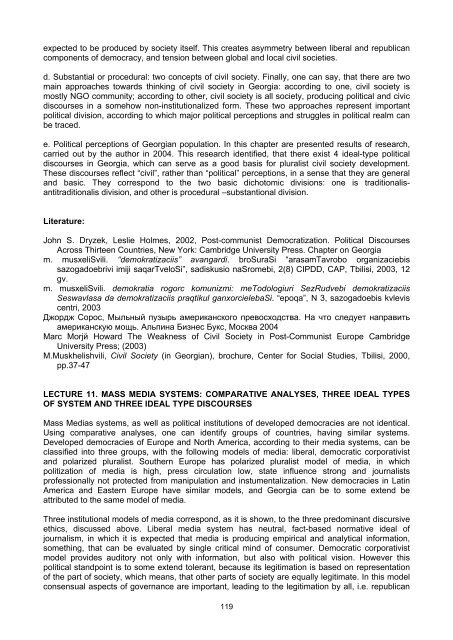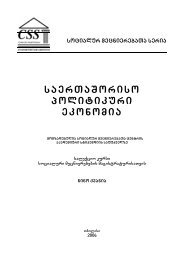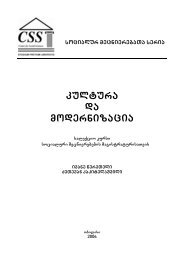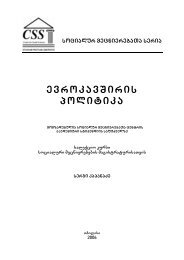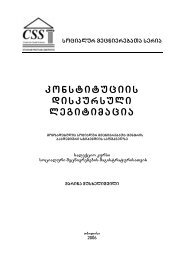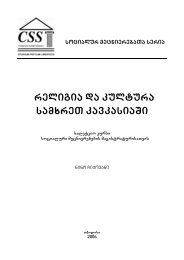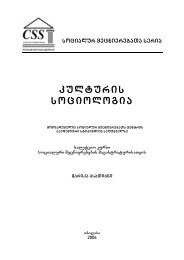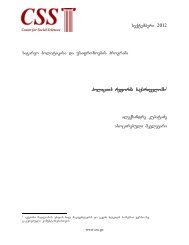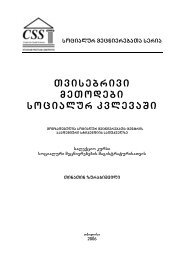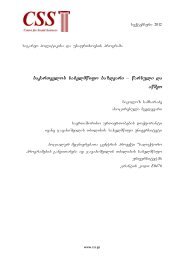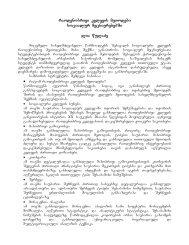samoqalaqo sazogadoeba - Center for Social Sciences
samoqalaqo sazogadoeba - Center for Social Sciences
samoqalaqo sazogadoeba - Center for Social Sciences
Create successful ePaper yourself
Turn your PDF publications into a flip-book with our unique Google optimized e-Paper software.
expected to be produced by society itself. This creates asymmetry between liberal and republican<br />
components of democracy, and tension between global and local civil societies.<br />
d. Substantial or procedural: two concepts of civil society. Finally, one can say, that there are two<br />
main approaches towards thinking of civil society in Georgia: according to one, civil society is<br />
mostly NGO community; according to other, civil society is all society, producing political and civic<br />
discourses in a somehow non-institutionalized <strong>for</strong>m. These two approaches represent important<br />
political division, according to which major political perceptions and struggles in political realm can<br />
be traced.<br />
e. Political perceptions of Georgian population. In this chapter are presented results of research,<br />
carried out by the author in 2004. This research identified, that there exist 4 ideal-type political<br />
discourses in Georgia, which can serve as a good basis <strong>for</strong> pluralist civil society development.<br />
These discourses reflect “civil”, rather than “political” perceptions, in a sense that they are general<br />
and basic. They correspond to the two basic dichotomic divisions: one is traditionalisantitraditionalis<br />
division, and other is procedural –substantional division.<br />
Literature:<br />
John S. Dryzek, Leslie Holmes, 2002, Post-communist Democratization. Political Discourses<br />
Across Thirteen Countries, New York: Cambridge University Press. Chapter on Georgia<br />
m. musxeliSvili. “demokratizaciis” avangardi. broSuraSi “arasamTavrobo organizaciebis<br />
sazogadoebrivi imiji saqarTveloSi”, sadiskusio naSromebi, 2(8) CIPDD, CAP, Tbilisi, 2003, 12<br />
gv.<br />
m. musxeliSvili. demokratia rogorc komunizmi: meTodologiuri SezRudvebi demokratizaciis<br />
Seswavlasa da demokratizaciis praqtikul ganxorcielebaSi. “epoqa”, N 3, sazogadoebis kvlevis<br />
centri, 2003<br />
Джордж Сорос, Мыльный пузырь американского превосходства. На что следует направить<br />
американскую мощь. Альпина Бизнес Букс, Москва 2004<br />
Marc Morjй Howard The Weakness of Civil Society in Post-Communist Europe Cambridge<br />
University Press; (2003)<br />
M.Muskhelishvili, Civil Society (in Georgian), brochure, <strong>Center</strong> <strong>for</strong> <strong>Social</strong> Studies, Tbilisi, 2000,<br />
pp.37-47<br />
LECTURE 11. MASS MEDIA SYSTEMS: COMPARATIVE ANALYSES, THREE IDEAL TYPES<br />
OF SYSTEM AND THREE IDEAL TYPE DISCOURSES<br />
Mass Medias systems, as well as political institutions of developed democracies are not identical.<br />
Using comparative analyses, one can identify groups of countries, having similar systems.<br />
Developed democracies of Europe and North America, according to their media systems, can be<br />
classified into three groups, with the following models of media: liberal, democratic corporativist<br />
and polarized pluralist. Southern Europe has polarized pluralist model of media, in which<br />
politization of media is high, press circulation low, state influence strong and journalists<br />
professionally not protected from manipulation and instumentalization. New democracies in Latin<br />
America and Eastern Europe have similar models, and Georgia can be to some extend be<br />
attributed to the same model of media.<br />
Three institutional models of media correspond, as it is shown, to the three predominant discursive<br />
ethics, discussed above. Liberal media system has neutral, fact-based normative ideal of<br />
journalism, in which it is expected that media is producing empirical and analytical in<strong>for</strong>mation,<br />
something, that can be evaluated by single critical mind of consumer. Democratic corporativist<br />
model provides auditory not only with in<strong>for</strong>mation, but also with political vision. However this<br />
political standpoint is to some extend tolerant, because its legitimation is based on representation<br />
of the part of society, which means, that other parts of society are equally legitimate. In this model<br />
consensual aspects of governance are important, leading to the legitimation by all, i.e. republican<br />
119


